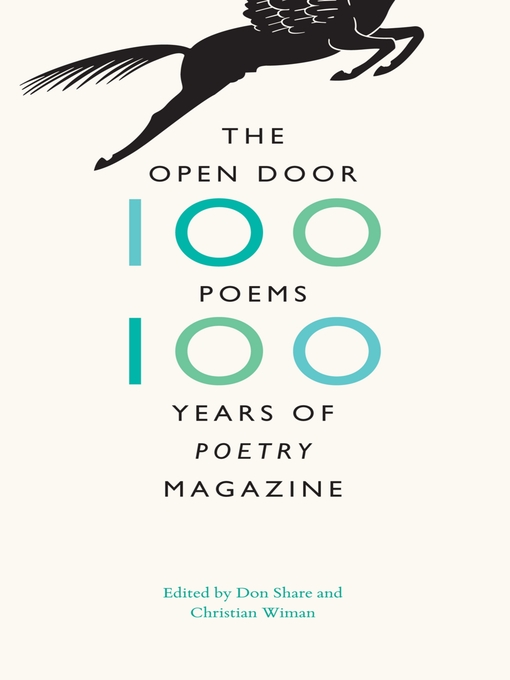
The Open Door
One Hundred Poems, One Hundred Years of "Poetry" Magazine: One Hundred Poems, One Hundred Years of "Poetry" Magazine
- اطلاعات
- نقد و بررسی
- دیدگاه کاربران
نقد و بررسی

Starred review from October 22, 2012
Founded in the flower of modernism, important (and importantly unpartisan) during the clash of styles and schools in the 1960s, and resurgent (as well as well-funded) today, the magazine out of Chicago has long had a place at the center of U.S. verse. Share and Wiman—who now hold the titles of editor and senior editor—select a delightful and powerful set of poems from the magazine’s history. Though the arrangement avoids chronological order, the earliest and the most recent years stand out, from T.S. Eliot’s “The Love Song of J. Alfred Prufrock” and Isaac Rosenberg’s WWI poetry to 21st-century work by Ange Mlinko and Laura Kasischke. In between come Marianne Moore, W.H. Auden, Lucille Clifton, and more leading lights, though the real distinction—emphasized by the order—lies in the poems from five or 50 years ago whose authors never became world-famous, such as the bittersweet rhymed quatrains in “On Leaving the Bachelorette Brunch,” by the late Rachel Wetzsteon. Tantalizing bits of prose from the magazine appear, almost like bookmarks, interspersed among poems: the philosopher Richard Rorty, for example, confesses, “I now wish that I had spent somewhat more of my life with verse.” With its friendly layout and its relative brevity, the volume feels like an extended issue of the magazine; it may find one life as a gift book, but it should find another as pleasure reading, especially for those who have not already discovered many of the poets here.

Starred review from August 1, 2012
This collection contains the best 100 poems to appear in Poetry magazine from its inception in 1912 to the present. At least, that's how editors Share and Wiman see it, and after reading Wiman's insightful and poetically written introduction as well as the poems selected, one would agree wholeheartedly. Culling from 300,000 poems, the editors sought aesthetic quality as opposed to well-known names, Often, they were able to find both a highly regarded poet and one of his or her best-known poems, like Ezra Pound's "In a Station at the Metro" or T.S. Eliot's "The Love-Song of J. Alfred Prufrock." Sometimes, the editors found (and rejected) poems with lines "that leap up...like the limbs of a prodded lab frog, then flop back down," as Wiman delightfully puts it. (One wishes he had mentioned the titles of these poems.) When founding editor Harriet Monroe began publishing this monthly periodical of poetry and criticism, she established an open-door policy, hoping to encourage both the great and the unknown to submit their work. The downside of this approach was including both the wheat and the chaff. The upside is evident here. VERDICT With this collection, Share and Wiman want only to promote the art of poetry, something they do exceedingly well. Highly recommended.--Diane Scharper, Towson Univ., MD
Copyright 2012 Library Journal, LLC Used with permission.

September 15, 2012
To celebrate the first century of Poetry and the brilliant Open Door editorial vision of its founder, Harriet Monroe, poets and Poetry editors Share and Wiman have created a high-wire anthology of electric resonance. To select 100 poems to mark each year of Poetry is a tidy concept. But Share and Wiman based their selections not on the prominence of the poets, though Poetry has published every poet of note during its time. Nor is the book arranged chronologically. Instead, they read through the entire archive of three-hundred-thousand poems, looking for, as Wiman explains in his vigorous introduction, the one-off masterpiece that juts up like a mountain from the landscape you thought you knew. The editors then arranged these redefining poems by poets of the pantheon and poets overlooked, underrated, or new in pairings and sequences of thrilling, contrapuntal dynamics. Wiman's opening essay is titled Mastery and Mystery, and those are, indeed, the forces at work here, inducing readers to marvel anew at the strange impulse to write poetry and the profound effort required to do it well.(Reprinted with permission of Booklist, copyright 2012, American Library Association.)




دیدگاه کاربران